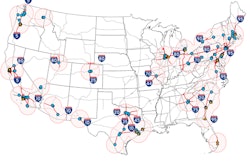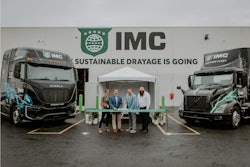In a time when environmental sustainability takes center stage across industries, the transport and logistics sector finds itself at a pivotal moment. The global demand for efficient and timely delivery services has propelled this industry to unprecedented heights, but it has also left an undeniable ecological footprint. As we step into 2024, the call for eco-friendly operations in transport and logistic management has never been more urgent, and companies are gearing up to embrace a greener approach to their practices.
The impact of traditional transportation and logistics management on the environment is undeniable. From carbon emissions to packaging waste, the industry has played a significant role in contributing to environmental challenges. Recognizing this, businesses are increasingly acknowledging the need for sustainable supply chain practices that not only align with global environmental goals but also cater to the growing eco-conscious consumer base.
Amidst this paradigm shift, new technology offers hope, including innovative solutions to minimize the environmental impact of supply chain management.
What are the 4 As of sustainable logistics?
In the changing world of transportation and logistics management, sustainability is no longer a choice but an imperative. To embark on the journey towards eco-friendly operations, businesses need a comprehensive framework that not only educates but also guides them through the process.
Enter the four A's of Sustainable Logistics – a strategic approach designed to bring about meaningful change in the industry.
Awareness: Navigating the environmental impact
In the realm of sustainable logistics, the first imperative is cultivating awareness. Stakeholders in the transport and logistics sector must comprehend the profound influence their operations wield on the environment. From fuel consumption during transportation to packaging materials, every aspect plays a role in shaping the ecological narrative. By fostering a deep understanding of these impacts, industry players can lay the groundwork for meaningful change.
Assessment: Gauging the carbon footprint
Assessment stands as the second crucial 'A' in our sustainable logistics paradigm. Evaluating the carbon footprint and overall environmental impact of logistics activities is paramount. We will guide you through the intricacies of conducting comprehensive assessments, offering insights into tools and methodologies that assist in quantifying environmental impacts.
Action: Strategies for emission reduction and waste management
Awareness and assessment pave the way for the next imperative – action. Actionable strategies for reducing emissions and minimizing waste within the logistics chain make a major difference. From optimizing route planning to embracing alternative fuels, there's a whole spectrum of innovative approaches. As the industry pivots towards eco-friendly operations, understanding these actionable steps becomes imperative for businesses aiming to align their practices with sustainable principles.
Achievement: Measuring the impact of sustainable practices
The final 'A' encapsulates the essence of progress – achievement. Sustainable logistics is an ongoing journey, and measuring the effectiveness of adopted practices is pivotal for continual improvement. This includes utilizing key performance indicators (KPIs) and metrics to gauge the success of sustainability initiatives. Understanding how to measure achievements not only serves as a testament to the commitment to eco-friendly operations but also provides a roadmap for setting and surpassing environmental targets.
Strategies for eco-friendly transport and logistics management
In the quest for a sustainable future, the transportation and logistics management sector is redefining its operational landscape. Embracing eco-friendly practices is no longer an option but a strategic imperative. This section unveils a comprehensive set of strategies, each carefully designed to usher in a new era of environmentally conscious transport and logistics management in 2024 and beyond. From optimized route planning to renewable energy adoption, these strategies serve as a roadmap for businesses aspiring to minimize their environmental footprint while maximizing operational efficiency.
Optimized route planning
In the pursuit of eco-friendly and effective logistics management, businesses can harness the power of advanced route optimization software. This technology enables the minimization of mileage and fuel consumption by identifying the most efficient routes. Real-time traffic data further facilitates dynamic adjustments, ensuring ongoing optimization. Additionally, the consolidation of shipments becomes a strategic move to reduce the overall number of vehicles on the road, promoting efficiency and contributing to emissions reduction.
Green vehicle fleet
The integration of electric and hybrid vehicles stands as a pivotal strategy for reducing carbon emissions. Regular maintenance and upgrades of the fleet are crucial to ensuring optimal fuel efficiency and minimizing environmental impact. Exploring alternative fuels, such as compressed natural gas (CNG) or biofuels, presents an opportunity to diversify the fleet's environmental footprint, aligning with sustainable practices.
Intelligent packaging solutions
Embracing sustainable packaging materials emerges as a fundamental step in minimizing waste and environmental impact. By adopting packaging designs that prioritize space efficiency, businesses can reduce the need for larger vehicles and, consequently, minimize fuel consumption. Collaboration with suppliers to encourage the adoption of eco-friendly packaging practices is essential for creating a more sustainable supply chain.
Technology integration
The integration of advanced transportation management platforms plays a pivotal role in streamlining operations and enhancing overall efficiency. Utilizing Internet of Things (IoT) devices for real-time tracking provides better visibility into the supply chain, reducing unnecessary delays and resource consumption. Data analytics further supports informed decision-making by identifying areas for improvement and optimizing resource utilization.
Collaborative logistics
Fostering partnerships and collaborations within the industry is a strategic approach to reducing environmental impact. Sharing resources, minimizing empty backhauls, and improving overall efficiency becomes achievable through collaborative efforts. Implementing shared distribution centers and transportation networks contributes to the consolidation of shipments and reduces the environmental impact of individual operations.
Renewable energy adoption
Investing in renewable energy sources for warehouse operations, such as solar or wind power, becomes a proactive step in reducing the carbon footprint of logistics facilities. On-site energy storage solutions optimize the use of renewable energy, minimizing reliance on traditional power sources. Additionally, eco-friendly facility designs that maximize natural light and ventilation reduce the need for artificial lighting and climate control.
Employee training and engagement
Training programs for staff on sustainable practices and the importance of eco-friendly operations are instrumental in fostering a culture of environmental consciousness. Employees actively participating in and contributing to sustainability initiatives can significantly impact the success of these strategies. Recognizing and rewarding environmentally responsible behavior further reinforces the commitment to eco-friendly practices among the workforce.
By implementing these strategies, businesses not only meet the growing demand for sustainable transportation and logistics management but also contribute significantly to a greener and more efficient future for the transport and logistics industry.













